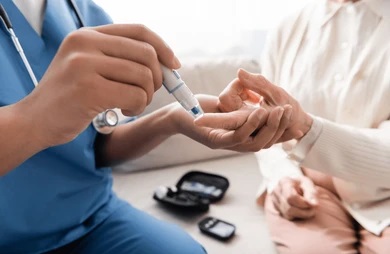By Blossom Ukoha
“Globally, women with diabetes have a right to a healthy future and to equitable access to diabetes medicines, technologies and self‑management education.” — World Health Organization (WHO)
On World Diabetes Day 2025, as the world marks the theme “Diabetes Across Life Stages,” attention turns to the unique challenges faced by women living with diabetes. As the World Health Organization reminds us, “women with diabetes have a right to a healthy future and to equitable access to diabetes medicines, technologies and self‑management education,” this day underscores the urgent need to ensure that every girl and woman, from adolescence through reproductive years and into older adulthood, has the tools, knowledge, and support to prevent, manage, and thrive despite diabetes. Recognizing these gender-specific barriers is critical not only for individual health but for empowering women, protecting maternal and child well-being, and strengthening families and communities globally.
The Rising Global Burden
According to the International Diabetes Federation (IDF) Diabetes Atlas 11th Edition (2025), 537 million adults (20–79 years) were living with diabetes in 2024, with women representing 276–280 million cases, or roughly 51–52%. By 2050, the total is projected to reach 783 million, meaning more than 400 million women could be affected if trends continue. Globally, one in ten women aged 20–79 now has diabetes; in high-burden regions like North America, the Middle East, and the Western Pacific, female prevalence exceeds 12–15%.
Hyperglycemia in pregnancy, including gestational diabetes, affected 1 in 6 live births globally in 2024, around 21 million pregnancies, with over 80% occurring in low- and middle-income countries. Women with a history of gestational diabetes face a 50–70% lifetime risk of developing type 2 diabetes, while their children have a 2–8 times higher risk of obesity and diabetes later in life. Alarmingly, 53% of diabetes cases remain undiagnosed, and in patriarchal settings, this proportion is often higher due to limited health-seeking behavior and access to screening.
Diabetes caused 6.7 million deaths in 2024, with women experiencing higher rates of cardiovascular complications and a 20–30% greater relative risk of fatal coronary heart disease than men with diabetes. Women also face twice the rate of depression, and higher rates of blindness, kidney failure, and lower-limb amputations in many regions. Despite global healthcare expenditure on diabetes reaching USD 1 trillion in 2024, women bear a disproportionate economic burden, often paying out-of-pocket or acting as unpaid caregivers for family members.
Challenges Women Face Across Life Stages
Diabetes intersects with women’s biology and social realities at every life stage.
Adolescence & Young Adulthood: Rising obesity, polycystic ovary syndrome (affecting 1 in 10 women of reproductive age), and early-onset type 2 diabetes are surging, particularly in urbanizing regions.
Reproductive Years: Gestational diabetes remains under-screened in many countries. Without universal testing, millions of women and their babies face preventable complications including stillbirth, neonatal hypoglycemia, and macrosomia.
Midlife & Menopause: Hormonal changes accelerate insulin resistance and cardiovascular risk. Women with diabetes lose the pre-menopausal heart-disease protection men never had.
Older Age: Elderly women with diabetes experience higher rates of frailty, disability, and institutionalization. They are also more likely to live alone and lack caregiver support.
Cross-Cutting Barriers: Gender bias in healthcare (dismissed symptoms), lower workforce participation (limiting insurance coverage), stigma around body weight, and the double burden of paid and unpaid work all delay diagnosis and worsen outcomes.
Global Initiatives to Support Women with Diabetes
Momentum is building through gender-responsive programs worldwide.
The WHO and IDF Global Diabetes Compact (2021, renewed 2024–2025) calls for integrating diabetes care into sexual, reproductive, maternal, and child health services, with indicators on gestational diabetes screening coverage. The Life Course Approach in the Prevention and Control of Diabetes (WHO 2024–2030) mandates gender mainstreaming and women-centered care across primary health services.
The FIGO Guidelines on Hyperglycemia in Pregnancy, adopted in over 100 countries, promote universal screening and postpartum follow-up. Initiatives like Changing Diabetes in Pregnancy (Novo Nordisk and partners) operate in 20+ low- and middle-income countries, training midwives and providing low-cost glucose testing.
Women in Global Health and the NCD Alliance’s Our Views, Our Voices programs amplify women’s lived experiences, influencing policy from UN High-Level Meetings to national strategies. Digital innovations such as Be He@lthy, Be Mobile deliver SMS and app-based support tailored to pregnant and postpartum women.
National successes include India’s integration of gestational diabetes screening into reproductive health programs, reaching tens of millions of pregnancies annually, and Rwanda and Bangladesh achieving near-universal antenatal glucose testing.
These efforts demonstrate that empowering women globally requires coordinated, life-stage-specific interventions, blending technology, community engagement, and policy.
Amazon’s Watch Magazine: A Global Call to Action
The statistics are a clarion call: hundreds of millions of women worldwide are living with diabetes, and untreated cases threaten empowerment, economic stability, and the health of future generations. Gestational diabetes, early-onset type 2, and undiagnosed cases create a ripple effect that impacts families, communities, and entire nations.
Global leaders must act decisively to safeguard women’s health. This means:
- Prioritizing resources for NCDs: Governments should allocate sufficient funding for diabetes prevention, treatment, and education, with dedicated budgets addressing women’s unique needs across all life stages.
- Implementing gender-responsive screening programs: Universal screening for gestational and type 2 diabetes must be prioritized in maternal, reproductive, and primary care settings to catch cases early and prevent long-term complications.
- Ensuring access to essential medicines and diagnostics: Affordable insulin, oral medications, glucose monitors, and self-management tools must be made universally available, including in rural and underserved communities.
- Shattering stigma through awareness campaigns: Ministries, schools, and workplaces should educate girls and women about healthy habits, provide supportive environments for managing diabetes, and normalize seeking care without shame or discrimination.
- Leveraging private sector innovation: Affordable solutions, including low-cost glucose testing, mobile health apps, telemedicine platforms, and solar-powered monitoring devices, can expand access and empower women to take control of their health.
- Mobilizing communities and youth: Peer support networks, women-led advocacy groups, and youth initiatives promoting active lifestyles can reinforce healthy behaviors and create a culture of care.
- Integrating mental health and social support: Addressing the emotional and psychological burden of living with diabetes is essential, as women disproportionately face depression, anxiety, and caregiving stress.
The world has confronted pandemics before; now it is time to unite for the women who sustain our families, communities, and nations. Bold, life-stage-specific action, inclusive policies, and global cooperation can ensure that no woman suffers unnecessarily, and that every generation grows stronger, healthier, and empowered.
When We Protect Women, We Protect Generations
World Diabetes Day 2025 is a global call to care, prevent, and empower. Safeguarding women’s health across all life stages strengthens families, communities, and nations. Every adolescent girl taught healthy habits, every pregnant woman screened and supported, and every adult empowered to manage her diabetes builds a healthier, thriving world.
Women are the backbone of society, neglect their health, and generations suffer. On this World Diabetes Day, commit to equitable care, life-stage-specific action, and empowerment for every woman. Healthy women mean a healthy world.





Comments are closed.